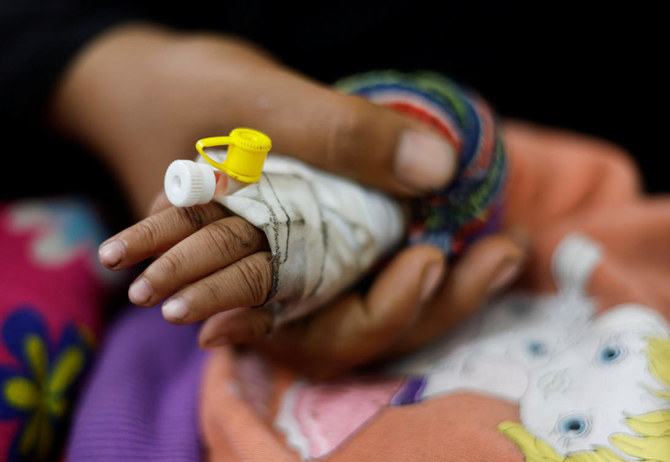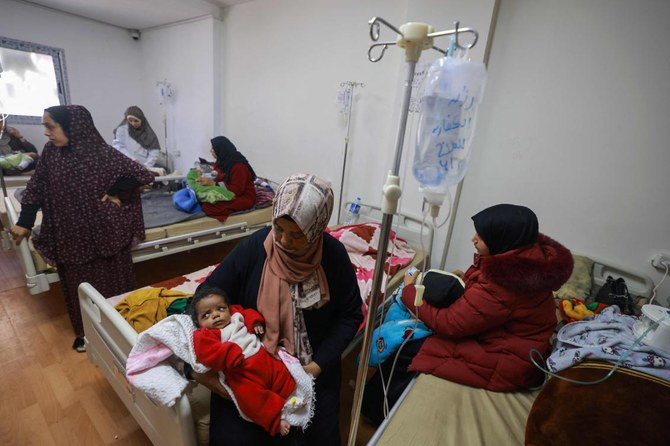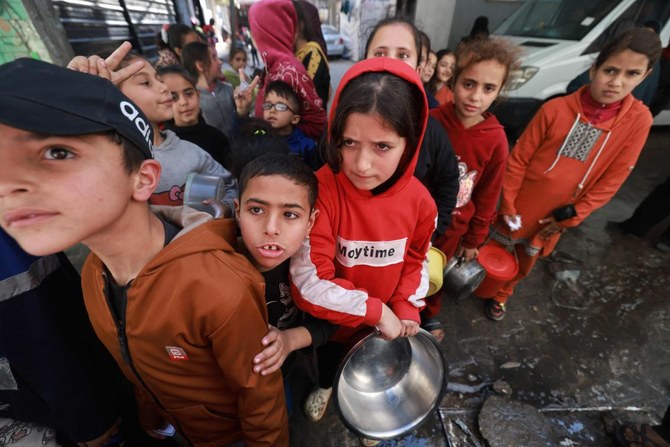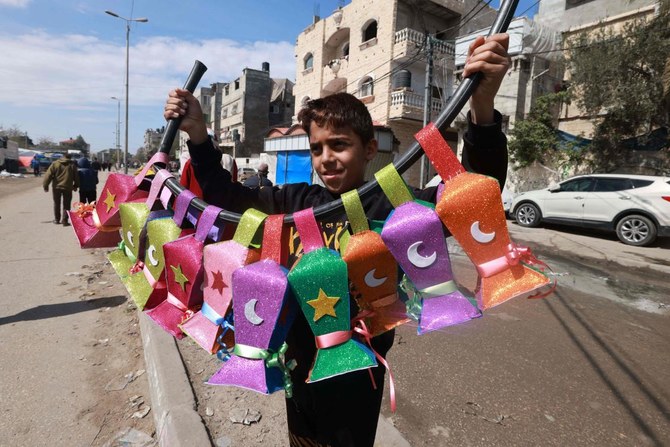GAZA STRIP, Palestinian Territories: For Muslims worldwide, Ramadan is a time of prayer, reflection and joyful evening meals, but all Gazans wish for this year is an end to five months of war and suffering.
It is a hope shared widely across the Islamic world, where the thoughts of many are with Gaza ahead of the fasting month which starts with the sighting of the crescent moon on Sunday or Monday.
The war sparked by Hamas’s October 7 attack against Israel has devastated Gaza, killed tens of thousands of Palestinians and triggered violence elsewhere in the Middle East, from Lebanon to the seas off Yemen.
Amid the ruins of southern Gaza, Nevin Al-Siksek sat recently outside her makeshift tent, distracting her young daughter from the carnage around them with a plastic Ramadan lantern.
The colorful fanous lanterns are an iconic symbol of Ramadan, the ninth month of the Islamic calendar marked by dawn-to-dusk fasting and, in better times, festive evening iftar meals with family and friends.
Across Gaza this year, the lights are among the few signs signalling the coming holy month, amid dire warnings of mass starvation.
While international mediators were hoping for a truce in time for Ramadan, no breakthrough had come by Friday.
Much of the territory of 2.4 million people has become a hellscape of bombed-out neighborhoods, emaciated children and mass graves dug in the sand.
Siksek and her family, instead of tucking into lamb and sweets at the home they had to flee in northern Gaza, will break their fast in the bare-bones tent they share with other displaced civilians.
If they can find anything to eat, that is.
“We do not have any food to prepare,” Siksek said as her husband, Mohammed Yasser Rayhan, nodded in agreement.
In the past during Ramadan, which commemorates the beginning of the Qur'anic revelation to the Prophet Muhammad in the seventh century, “there was life, joy, spirit, decorations and a beautiful atmosphere,” Rayhan said.
“Now Ramadan is coming and we have war, oppression and famine.”
The Gaza war erupted after Hamas staged an unprecedented attack on southern Israel that resulted in the deaths of around 1,160 people, mostly civilians, according to an AFP tally based on official Israeli figures.
Israel’s retaliatory military campaign has killed at least 30,800 people so far, the vast majority women and children, according to Hamas-run Gaza’s health ministry.
Other parts of the Islamic world may be grappling with their own challenges, from conflicts to high inflation. But many Muslims say their thoughts are with Palestinians this year.
“Every time I pray, I always send a prayer for our brothers and sisters in the Palestinian territory,” said Indonesian housewife Nurunnisa, 61, in Aceh province in the west of the country with the world’s largest Muslim population.
“I can’t help them with anything so I can only help them with prayer. I pray the war will be over soon. The people there are suffering so much.”
The reports of looming famine in Gaza, where desperate residents have taken to eating slaughtered horses and even leaves, also weigh heavily on Jordanian father-of-five Saif Hindawi, he said as he shopped for rice and oil in Amman.
“Imagine in Jordan, there are high prices, but there is still the ability to buy what is available,” said the 44-year-old.
In Gaza, he said, “they have used animal fodder to make bread.”
The war has had a severe impact on southern Lebanon, where Iran-backed Hezbollah militants have exchanged near-daily strikes with Israel and tens of thousands have been displaced on both sides of the border.
Retired teacher Maryam Awada, now living in a school-turned-shelter in the city of Tyre, said she would be unable to fast this Ramadan because of the stress.
“God will not force me to fast here in this hall we’re living in,” she said.
In Yemen, Iran-backed Houthi rebels began firing missiles at vessels linked to Israel in November.
The Houthis’ campaign has won them fans abroad, but within Yemen it has worsened a humanitarian crisis brought on by a nearly decade-long civil war.
In the port city of Hodeida, an area targeted by anti-Houthi US strikes, restaurant manager Ali Mohammad said he was bracing for a lean month.
“When the air strikes began, business suddenly collapsed,” he said. “If the situation continues... our only option will be to close down.”
In Somalia’s capital, trader Abdirahim Ali said he worried the Red Sea crisis would drive up prices, something that “affects people during Ramadan” especially.
Muslims in Israeli-annexed east Jerusalem worry about violence at the Al-Aqsa mosque compound, a regular flashpoint.
The site is Islam’s third-holiest and Judaism’s most sacred, known to Jews as the Temple Mount.
During Ramadan, Muslims in their tens and even hundreds of thousands pray at the compound’s iconic Dome of the Rock.
But in February, Israel’s hard-right National Security Minister Itamar Ben Gvir argued that Palestinian residents of the occupied West Bank “should not be allowed” entry to Jerusalem during Ramadan.
Prime Minister Benjamin Netanyahu’s office said on Tuesday that worshippers would be allowed to enter the mosque “in similar numbers” to past years.
That did little to reassure Ahlam Shaheen, 32, who works at a community center near Al-Aqsa.
When Israeli police stormed the mosque in 2021, Shaheen saw women praying next to her get shot with rubber bullets, and she fears it could happen again.
“We’re living with the war for five months now,” she said. “We’re really tired and drained.”
In Cairo, the most festive of cities during Ramadan, a Gazan student who asked not to be named feared the holy month this year would be unbearable.
“For the first time in my life, I can’t stand the idea of Ramadan,” she said. “It hurts every time I see a fanous,” she said about the lanterns that festoon the city’s streets.
“My brothers and sisters can’t even eat once a day, and we’re supposed to have a fast-breaking meal like everything is normal?“
‘It hurts’: Gaza war robs Muslim world of Ramadan joy
https://arab.news/mf5vd
‘It hurts’: Gaza war robs Muslim world of Ramadan joy

- Amid the ruins of southern Gaza, Nevin Al-Siksek sat recently outside her makeshift tent, distracting her young daughter from the carnage around them with a plastic Ramadan lantern
- Across Gaza this year, the lights are among the few signs signalling the coming holy month, amid dire warnings of mass starvation
Hunger returns to Gaza as Israeli blockade forces bakeries shut

- UN agency: All 25 WFP-supported bakeries in Gaza have shut down due to lack of fuel and flour
- International charities working in Gaza warn that its 2.4 million people cannot endure more shortages
GAZA CITY, Palestinian Territories: At an industrial bakery in war-ravaged Gaza City, a conveyor belt that once churned out thousands of pitta breads every day has come to a standstill.
The Families Bakery is one of about two dozen supported by the World Food Programme (WFP) that have halted production in recent days due to flour and fuel shortages resulting from an Israeli blockade.
“All 25 WFP-supported bakeries in Gaza have shut down due to lack of fuel and flour,” the UN agency said in a statement on Tuesday, adding that it would “distribute its last food parcels in the next two days.”
Abed Al-Ajrami, chairman of the Bakery Owners Association in Gaza and owner of the Families Bakery, said that the WFP was the only sponsor of Gaza bakeries and provided them with “all their needs.”
“The repercussions from the closure of the bakeries will be very hard on citizens because they have no alternative to resort to,” he said.
Speaking in front of a large industrial oven that had not been fired up, he said that bakeries were central to the UN agency’s food distribution program, which delivered the bread to refugee camps across Gaza.
Despite a six-week truce that allowed displaced Gazans to return to what remained of their homes, negotiations for a lasting end to the fighting have stalled.
On March 2, Israel imposed a full blockade on the Palestinian territory, and cut off power to Gaza’s main water desalination plant.
On March 18, Israel resumed its strikes on Gaza. Days later, Hamas again began firing rockets at Israel.
The Palestinian militant group has accused Israel of using starvation as “a direct weapon in this brutal war,” pointing to the bakeries’ closure as an example.
It called on Arab and Muslim countries to “act urgently to save Gaza from famine and destruction.”
Residents of Gaza City were wary of the future.
“I got up in the morning to buy bread for my children but I found all the bakeries closed,” Mahmud Khalil said.
Fellow resident Amina Al-Sayed echoed his comments.
“I’ve been going from bakery to bakery all morning, but none of them are operating, they’re all closed,” she said, adding that she feared the threat of famine would soon stalk Gaza once again.
“The price of flour has risen... and we can’t afford it. We’re afraid of reliving the famine that we experienced in the south” of the territory.
International charities working in Gaza warn that its 2.4 million people cannot endure more shortages after many of them were displaced multiple times during the devastating military campaign Israel launched in response to Hamas’s October 2023 attack.
Those who took advantage of the six-week truce to return to bombed out homes have been “arriving in utter destitution,” said Gavin Kelleher of the Norwegian Refugee Council.
“We’ve been set up to fail as a humanitarian response. We’re not allowed to bring in supplies, we’re not able to meet needs,” he lamented.
Alexandra Saieh, of British charity Save The Children, echoed Kelleher’s remarks.
“When Save The Children does distribute food in Gaza, we see massive crowds because every single person in Gaza is relying on aid,” she said.
“That lifeline has been cut.”
Israel expands military effort in Gaza, 15 killed since morning

- Israeli defense minister says large areas in Gaza would be seized and added to Israel's security zones
- Israel resumed air strikes on Gaza and sent ground troops back this month after fragile truce collapsed
JERUSALEM: Israeli Defense Minister Israel Katz announced a major expansion of the military operation in Gaza on Wednesday, saying large areas of the enclave would be seized and added to the security zones of Israel.
In a statement, Katz said there would be large-scale evacuation of population from areas where there is fighting, and urged Gazans to eliminate Hamas and return Israeli hostages as the only way to end the war.
He did not make clear how much land Israel intends to seize, however.
Gaza rescuers say 15 killed in Israeli strikes on two houses
Gaza’s civil defense agency said Israeli air strikes on two houses in the war-ravaged Palestinian territory on Wednesday killed at least 15 people, including children.
“Thirteen martyrs, including children, were killed at dawn when occupation forces (the Israeli army) bombed a house sheltering displaced people in central Khan Yunis, in southern Gaza,” civil defense spokesman Mahmud Bassal told AFP, adding two other people were kiled in an Israeli strike on a house in the Nuseirat camp, in central Gaza.
Israel has already set up a significant buffer zone within Gaza, expanding an area that existed around the edges of the enclave before the war and adding a large security area in the so-called Netzarim corridor through the middle of Gaza.
At the same time, Israeli leaders have said they plan to facilitate voluntary departure of Palestinians from the enclave, after US President Donald Trump called for it to be permanently evacuated and redeveloped as a coastal resort under US control.
Israel resumed air strikes on Gaza and sent ground troops back in this month, after two months of relative calm following the conclusion of a US-backed truce to allow the exchange of hostages held by Hamas for Palestinian prisoners in Israeli jails.
Efforts led by Qatari and Egyptian mediators to get back on tracks talks aimed at ending the war have failed to make progress yet.
Israeli Prime Minister Benjamin Netanyahu has said the application of military pressure is the best way to get the remaining 59 hostages back.
Young Turks drive protests against Erdogan as new generation seeks change

- Hundreds of thousands of Turks nationwide have heeded opposition calls to protest since Imamoglu was detained last week
- As protests continue, young Turks insist their demands are simple: democracy, accountability, and a future worth staying for
ANKARA: A new generation of young Turks is at the forefront of mass protests against President Tayyip Erdogan’s government, demanding change in a country they see as increasingly authoritarian. Demonstrations erupted after Istanbul Mayor Ekrem Imamoglu, a popular opposition figure, was jailed pending trial on corruption charges. Unlike older generations who remember the heavy crackdown on the 2013 anti-government Gezi Park protests, today’s young protesters say they are undeterred by the risks.
“I think growing up under just one regime makes us a generation looking for change, looking for proof we live in a democracy,” said Yezan Atesyan, a 20-year-old student at Middle East Technical University (METU).
“The idea of a power that lasts forever scares us.”
Hundreds of thousands of Turks nationwide have heeded opposition calls to protest since Imamoglu was detained last week.
Protests have been mostly peaceful, but more than 2,000 people have been detained.
The main opposition Republican People's Party (CHP), other opposition parties, rights groups and some Western powers have all said the case against Imamoglu is a politicised effort to eliminate a potential electoral threat to Erdogan.
The government denies any influence over the judiciary and says the courts are independent.
Students from across Turkey have mobilized, facing police blockades and water cannon trucks. Drone footage from METU captured clashes between protesters and state security forces.
Atesyan said all were targetted in the crackdown: "Not just minorities, not just women, not just the LGBT community — it is against all of us."
A GENERATION ON EDGE
Beyond political frustration, economic hardship has fueled the unrest. High inflation and unemployment have made young people feel their future is slipping away.
“I graduated in 2024, but I can’t find a job, and my family struggles financially,” said 25-year-old protester Duygu at an opposition rally in Istanbul.
She fears for her safety but also worries about her friends. “Some of them have already been detained.”
Concerns over the state's response are growing. “I don’t want to show my face because the police could come for me,” said Duygu, who wears a mask at protests. “If that happens, it would devastate my family.”
Despite the risks, demonstrators remain resolute.
“This feels like our last chance,” Atesyan said.
“If we don’t succeed, many of us will have to leave Turkey.”
The government dismisses the protests as politically motivated, but the youth-driven unrest signals a growing divide.
“Imamoglu represents hope,” Atesyan said. “The possibility of real change.”
As protests continue, young Turks insist their demands are simple: democracy, accountability, and a future worth staying for.
Israel expands military effort in Gaza, 15 killed since morning

- Katz said there would be large-scale evacuation of population from areas where there is fighting
JERUSALEM: Israeli Defense Minister Israel Katz announced a major expansion of the military operation in Gaza on Wednesday, saying large areas of the enclave would be seized and added to the security zones of Israel.
In a statement, Katz said there would be large-scale evacuation of population from areas where there is fighting, and urged Gazans to eliminate Hamas and return Israeli hostages as the only way to end the war.
He did not make clear how much land Israel intends to seize, however.
Gaza rescuers say 15 killed in Israeli strikes on two houses
Gaza’s civil defense agency said Israeli air strikes on two houses in the war-ravaged Palestinian territory on Wednesday killed at least 15 people, including children.
“Thirteen martyrs, including children, were killed at dawn when occupation forces (the Israeli army) bombed a house sheltering displaced people in central Khan Yunis, in southern Gaza,” civil defense spokesman Mahmud Bassal told AFP, adding two other people were kiled in an Israeli strike on a house in the Nuseirat camp, in central Gaza.
Israel has already set up a significant buffer zone within Gaza, expanding an area that existed around the edges of the enclave before the war and adding a large security area in the so-called Netzarim corridor through the middle of Gaza.
At the same time, Israeli leaders have said they plan to facilitate voluntary departure of Palestinians from the enclave, after US President Donald Trump called for it to be permanently evacuated and redeveloped as a coastal resort under US control.
Israel resumed air strikes on Gaza and sent ground troops back in this month, after two months of relative calm following the conclusion of a US-backed truce to allow the exchange of hostages held by Hamas for Palestinian prisoners in Israeli jails.
Efforts led by Qatari and Egyptian mediators to get back on tracks talks aimed at ending the war have failed to make progress yet.
Israeli Prime Minister Benjamin Netanyahu has said the application of military pressure is the best way to get the remaining 59 hostages back.
US adding second aircraft carrier to fleet in Middle East

- The Harry S. Truman carrier strike group will be joined by the Carl Vinson
- US forces hammer Yemen’s Houthi militia with near-daily air strikes aimed at ending the threat they pose
WASHINGTON: The United States is increasing the number of aircraft carriers deployed in the Middle East to two, keeping one that is already there and sending another from the Indo-Pacific, the Pentagon said Tuesday.
The announcement comes as US forces hammer Yemen’s Houthi militia with near-daily air strikes in a campaign aimed at ending the threat they pose to civilian shipping and military vessels in the region.
The Carl Vinson will join the Harry S. Truman in the Middle East “to continue promoting regional stability, deter aggression, and protect the free flow of commerce in the region,” Pentagon spokesman Sean Parnell said in a statement.
“To complement the CENTCOM maritime posture, the secretary also ordered the deployment of additional squadrons and other air assets that will further reinforce our defensive air-support capabilities,” Parnell said, referring to the US military command responsible for the region.
“The United States and its partners remain committed to regional security in the CENTCOM (area of responsibility) and are prepared to respond to any state or non-state actor seeking to broaden or escalate conflict in the region,” he added.
The Houthis began targeting shipping in the Red Sea and Gulf of Aden after the start of the Gaza war in 2023, claiming solidarity with Palestinians.
Houthi attacks have prevented ships from passing through the Suez Canal, a vital route that normally carries about 12 percent of world shipping traffic. Ongoing attacks are forcing many companies into a costly detour around the tip of southern Africa.
A day before the carrier announcement, US President Donald Trump vowed that strikes on Yemen’s Houthis would continue until they are no longer a threat to shipping.
“The choice for the Houthis is clear: Stop shooting at US ships, and we will stop shooting at you. Otherwise, we have only just begun, and the real pain is yet to come, for both the Houthis and their sponsors in Iran,” Trump said on his Truth Social platform.
Trump added that the Houthis had been “decimated” by “relentless” strikes since March 15, saying that US forces “hit them every day and night — Harder and harder.”
He has also ramped up rhetoric toward Tehran, with the president threatening that “there will be bombing” if Iran does not reach a deal on its nuclear program.
Trump’s threats come as his administration battles a scandal over the accidental leak of a secret group chat by senior security officials on the Yemen strikes.
The Atlantic magazine revealed last week that its editor — a well-known US journalist — was inadvertently included in a chat on the commercially available Signal app where top officials were discussing the strikes.
The officials, including Trump’s National Security Adviser Mike Waltz and Defense Secretary Pete Hegseth, discussed details of air strike timings and intelligence — unaware that the highly sensitive information was being simultaneously read by a member of the media.
























